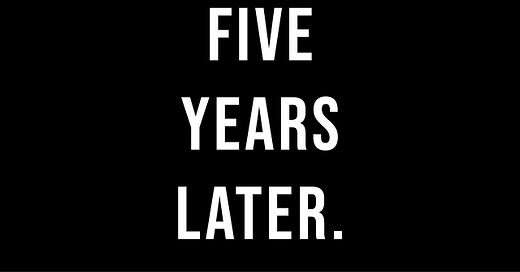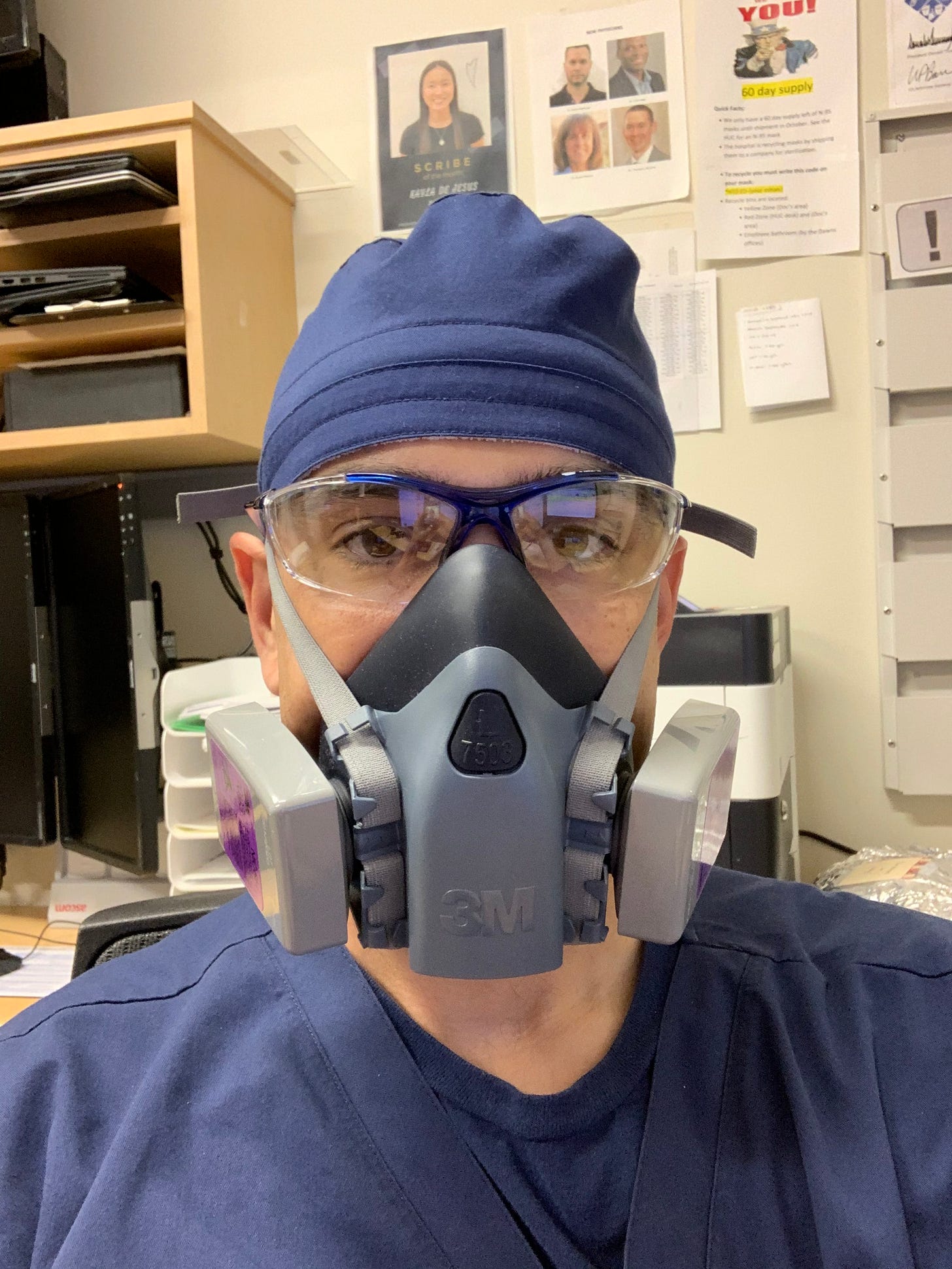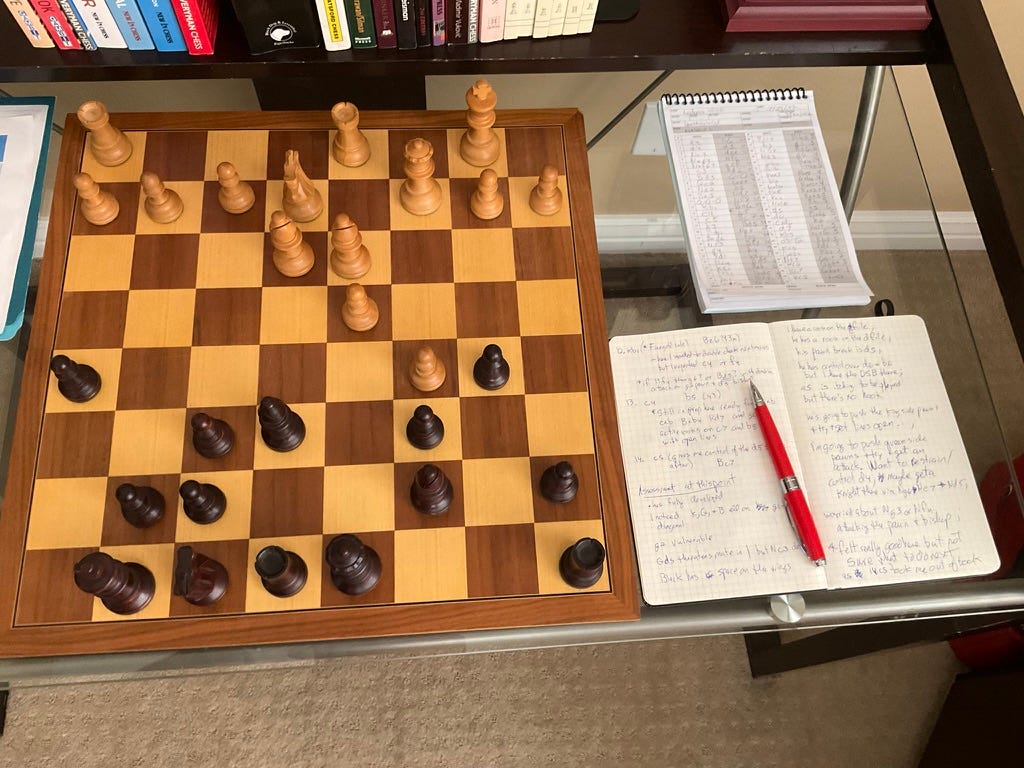Welcome back to Chess in Small Doses. Today is going to be a different, more personal post reflecting on the last 5 years of being an #adultimprover at chess. Let’s get into it.
On February 25th, 2020 Nancy Messonnier stepped up to the podium at the CDC and announced we should expect community spread of COVID 19. I been aware of COVID since November. Novel respiratory illnesses are something ER docs follow closely given our exposure. I knew that everything was about to change. My wife and I bought the last large freezer at Lowes, and I told everyone in my family to prepare for a pandemic. By March the world shut down and one of my fellow docs got sick with COVID in April. Scary times.
Right around the same time I had realized the chess I was trying to teach my kid wasn’t her dream but mine. Back in 2018 I had found a podcast called Perpetual Chess and I began following it. I listened to Ben Johnson interview CM Han Schut about the Steps Method. Thinking I would teach my daughter, I bought the whole series of workbooks. By the time COVID came into existence in late 2019, I had already started studying them myself. I reached out to Han, who was kind enough to take me on as a student, saying he would make time for “a hero.”
Since that day I have played 38 USCF rated OTB games, 491 Rapid and Classical online games, and an embarrassing 2,288 Blitz games (including one I played while writing this). I have gained peak ratings of 1693 Chess.com Rapid, 2135 Lichess Rapid, and 1983 Lichess Classical. I have attained a peak USCF rating of 1613 as well, but I have stepped back from those peaks a little. I have appeared on Perpetual Chess twice, Chess Journeys once, and was most recently interviewed on Dr. Can’s Chess Clinic. It’s been a great run, but I think it’s fair to say now that chess saved me.
2 Very Difficult Years
Our first lesson was January 13, 2020. I recall him telling me two things right off the bat. The first was that I played “good chess.” That was nice to hear, sitting at 1450ish on Chess.com at the time. But then he asked me if I felt I had missed “some basic things.” Absolutely, I said. I was nearly completely self taught having never really done any formal study. I had absorbed whatever I could from friends and books. I cannot recall if it was that day or later but he let me know that my opening preparation was a “little light.” A kind way of saying I didn’t know my openings. He asked me to switch from 1.d4 to 1.e4 and play gambits like The Scotch Gambit and The Evans Gambit. He also asked me to switch to The Grunfeld against 1.d4 and we decided I should stay with my Caro Kann against 1.e4. The point was to learn tactics and the value of a tempo he had explained.
We had a lesson each week. He gave me homework and asked me to play in some games for us to review. This structured lasted for the next 2 years until we ended our lessons after my interview on the Perpetual Chess Podcast in July 2022. Every week there was work to do and progress to be made. And thank God that structure was there. I think I can say that chess saved me from what happened next.
Soon after that, our entire world was upended by the pandemic. Like everyone else we could just watch and react to events, we couldn’t stop them. Unlike many other people, my profession made COVID a daily experience. I watched so many people get sick. Many of them lived, some of them didn’t. Early on in the pandemic there was a lot of support for frontline medical staff and paramedics. We were called “heroes” and there was tremendous spirit. In New York, there were cheers every night. Then May 2020 came, and a video called Plandemic came out. Suddenly the conspiracy theories started and whatever support we had experienced became political. On the “inside” we were scrambling to find enough PPE to not get exposed ourselves. To our horror, we watched other doctors and nurses get sick and even some died. Someone started a Facebook page with memorials for all the healthcare workers who had died from COVID. Simple treatments for patients were hard to get unless it was truly lifesaving. No one wanted to come in to see patients and get exposed.
Many of the doctors I worked with all bought painter’s respirator masks with N95 cartridges on their own. One of us had found out that a local Home Depot had a small supply and the entire group was notified to get down there right away. That’s where I bought mine. They worked to filter the air, but none of the patients could hear us unless we shouted. By June 2020, we were either being hailed as heroes or attacked as members of the conspiracy. Some patients accused us of lying for monetary gain. Others flatly denied that COVID even existed as one of their family members was dying from it. Soon after, nurses started quitting. By the end of the COVID pandemic some 100K+ nurses across the country had decided nursing was no longer for them. As big of a loss as that is (and it’s big), the biggest loss from that time was the public’s trust in science, as well as doctors’ and nurses’ trust in our patients. I don’t believe that trust has recovered despite the pandemic’s end.
Like everyone else who had kids, August saw us become unpaid teacher’s aides for my daughter’s online 3rd grade class. That was madness. No kid wants to sit for that long, and no adult wants to be the enforcer keeping them glued to the computer screen. Then in January 2021, my father in law died. He had been battling leukemia since 2019 and COVID’s impact on hospitals didn’t help. He was a great man who left the greatest legacy anyone can have, successful children who knew they were loved. He was the tent pole holding up his family and his loss was a tremendous impact. Soon after that, I also nearly lost my father as well to COVID. Somehow he survived but he went in at 200+ lbs and came out of the hospital a month later at 135lbs and very weak. Thankfully he made a full recovery, though it took him years.
Finding a Quiet Space
During that time, I had chess. Each week I had a lesson, some Steps homework, and I had a game. What chess gave me was a quiet space. A space bounded by 4 sides and spread across 64 squares. It was a place I could go where no one was dying. It had rules and mysteries, and the promise of endless progress. Like Don Quixote, I tipped my lance at the idea of becoming a Master. “How hard can it be?”, I thought. Dunning-Kruger effect indeed.
I played in my first OTB tournament in April 2021, going 3/4. We all wore masks and weren’t allowed to take them off. Still, I loved it. I found the #chesspunks community on Twitter and started connecting. I listened to Perpetual Chess, Chess Journeys, and of course watched the Queen’s Gambit. I bought book after book, even reading some. I became something I had always wanted to be: a chess player.
Chess gave me a counter weight, a balance to the events of the day. While every day I went to work felt dark, the chess board was always inviting. I made progress, going from Step 3 to Step 4 and then onto Step 5. By the time of my interview in July 2021, I was very good at solving Chess Steps puzzles. My chess games on the other hand… I had gotten better for sure, but I had persistent issues. I’ll get into them a little later, but suffice to say it’s still a work in progress.
Wandering in the Wilderness
Sometime after I made it to Step 5, Han let me go. He told me I needed to take the next step of the journey on my own. I’ve always wondered if I said or did something during my Perpetual Chess appearance that he found objectionable. However, I see now that maybe I had stopped listening to him. I was always trying to find the next edge or shortcut, when that’s not what’s needed. I didn't like it, but I respected his decision. What ended that day was the structure that had supported me for the previous 2 years. Coaches give you a lot, but there’s one thing they give you that isn’t talked about much. They are someone who cares about the game you play. They care about the result, and how you did. They are someone you can tell your story to. I think for me this was the greatest value. I missed that after it was gone. For the record, let me say thank you Han for all you gave me.
So began my period of wandering in the wilderness of chess improvement. I looked around for coaches and tried many, some of whom you’d recognize their names. Many of them I just didn’t click with. The ones that I stayed with for more than one or two lessons noted the contrasting strengths and weaknesses of my game. The strengths were good, but the weaknesses were glaring. Many times I played too fast. I missed simple threats or tactics for both sides. I didn’t always consider my opponent’s moves, sometimes falling into traps or blunders. Other times I played like a much higher rated player. I remember one coach saying “There’s something bigger here” meaning I had more fundamental challenges and that he’s probably not the right coach.
By Spring Break in 2022, COVID was a different beast. We hit some critical threshold along the way and suddenly COVID became a much less dangerous virus. We were no longer were seeing people in respiratory failure, close to death. What we were seeing however was all the people who had put off their care for years. So many people were now coming in with cancer, strokes, or gangrene from their diabetes that had gone untreated. It was still pretty rough.
I joined the Chess Dojo and tried to spar, find a +, and engage with chess. The drive and the need to have that quiet space was still there, but it was harder to find. The Polgar mates became my weekly work, and that lasted for quite awhile. But the staccato nature of my work didn’t allow for me to really do all the work of the cohort, and I got discouraged. My rating suffered. I hit a peak of 1983 Classical on June 14th, 2022 and then had a slow bleed for two years.
Writing to Learn
I got frustrated with my stagnation. I imagine everyone can relate. I wanted to know what was it that I was missing? Along came Noel Studer and I was in… lured by the promise of simplicity and structure. I can say that Noel’s programs do deliver that, and I would recommend his program to anyone thinking of jumping in. Still, after all this time I can say having someone else tell me what to do has become less and less helpful.
What helped me the most was writing about chess. In March 2023 I published my first Substack post for Chess in Small Doses. All the struggles, success, victories and defeats gave me something to write about. What I have been trying to piece together with these posts is “How do adults become good at chess?” Writing has allowed me to process everything I’ve been through since 2020.
In our first lesson, Han asked me if I thought I had missed some “basic things” and the answer was yes. One of those basic things was the skill of visualization. I could do tactics because I was good at pattern recognition. But the actual game of chess is choosing which possible future you think is best for your side. I began to work on that thanks to both Aiden Rayner and my last coach, Ian Harris. Including visualization into my training has helped me a lot. Another thing that helped was changing openings to be more consistent. I went back to 1.d4 with the London and chose The Slav to play against 1.d4. All three of my openings (London, Slav, and Caro Kann) share a common pawn structure and ideas. Gambits are very forcing, but miss one move and you’re lost.
Writing about chess has given me that quiet space again. It’s allowed me to explore, to think, and to share this game we all love. Since the demise of Twitter into X, I no longer had an online community. I have tried to make one here. I’ve joined other chess writers and improvers in asking “How do adults get better at chess?” Now after 5 years, I think I have an answer. I’ll have to save that for the next post.
We’ll See
So thank you to you, the reader, for being part of this chess community. We’re all doing this for fun, and on our own dime. None of us are likely to ever make money at chess which may very well be the reason we like it so much. There’s a fine line between play and work but one thing is clear. Once play becomes work, it’s not fun anymore. Chess is still fun for me 5 years later. I look forward to my games, I enjoy training, and I enjoy writing about it.
As for what the future holds, I can say only that we’ll see. I would love to play much more OTB but I have accepted that my “real” work as an emergency physician, father, and husband will make that unlikely. Recently I was reading through Perpetual Chess Improvement and came to some conclusions. I can give myself structure. I don’t need anyone else to do that. I can set process goals and allow my games to show me where I am weak. I can coach myself through game analysis and repetition of basic tactics. I can make my own plan.
I have come to believe that amateurs can reach ELO 1800+ all on their own by getting really good a simple tactics. That’s 1, 2, or even 3 move tactics. Much past 3 moves is not really worth our time yet. The vast majority of our games will have some of these basic tactics in them. Heck, simply not dropping pieces so often will get you to 1200. All of that has led me to what I believe is a set of habits that are critical for adults to get better at chess. Train consistently, even if it’s just a little. Work on the basics so that you never miss them. Don’t memorize openings so much as understand them. Know the plans (aka useful moves) and the pawn breaks for the positions you get. Accept that losing is part of the process of learning. Take the long, slow road of perpetual improvement. Most importantly, don’t forget it’s just a game where the outcome won’t really matter that much even to the two people playing it.
I’m just grateful 5 years later to have had chess at some of the most challenging times in my life. Chess has given me structure, space, and a direction. As was once said “Life is a direction not a destination.” We’ll see where I end up.
Thanks for reading. Next time I’ll share the one thing that took me 5 years to learn. See you then.








Nick, I'm a 60 year old retired accountant and I love chess, excel and accounting, not necessarily in that order. You're talking about evolution in adults. Obviously we can't follow the techniques of young people. So how about taking a more real shortcut? https://matthewsadler.me.uk/ is a good example. It shows that engines have evolved so much that they no longer use brute force, but rather good old strategies copied from humans. Have you ever tried something like this... if so, please enlighten us... thank you and please don't leave us orphans, keep producing...
Nick, just wanted to let you know that I've started reading your 'stack' a few months ago after seeing a referral from Ben Johnson. I am really enjoying it. Though I am a slightly higher rated player (1800+ OTB), I am now close to 51 and only about 6 months into a 'comeback' after taking a 22 year hiatus to focus on my family and career as an electrical engineer. I read a lot of parallels in your story that are in mine, so it is really resonating with me. Keep up the great work!
- Steve Smith